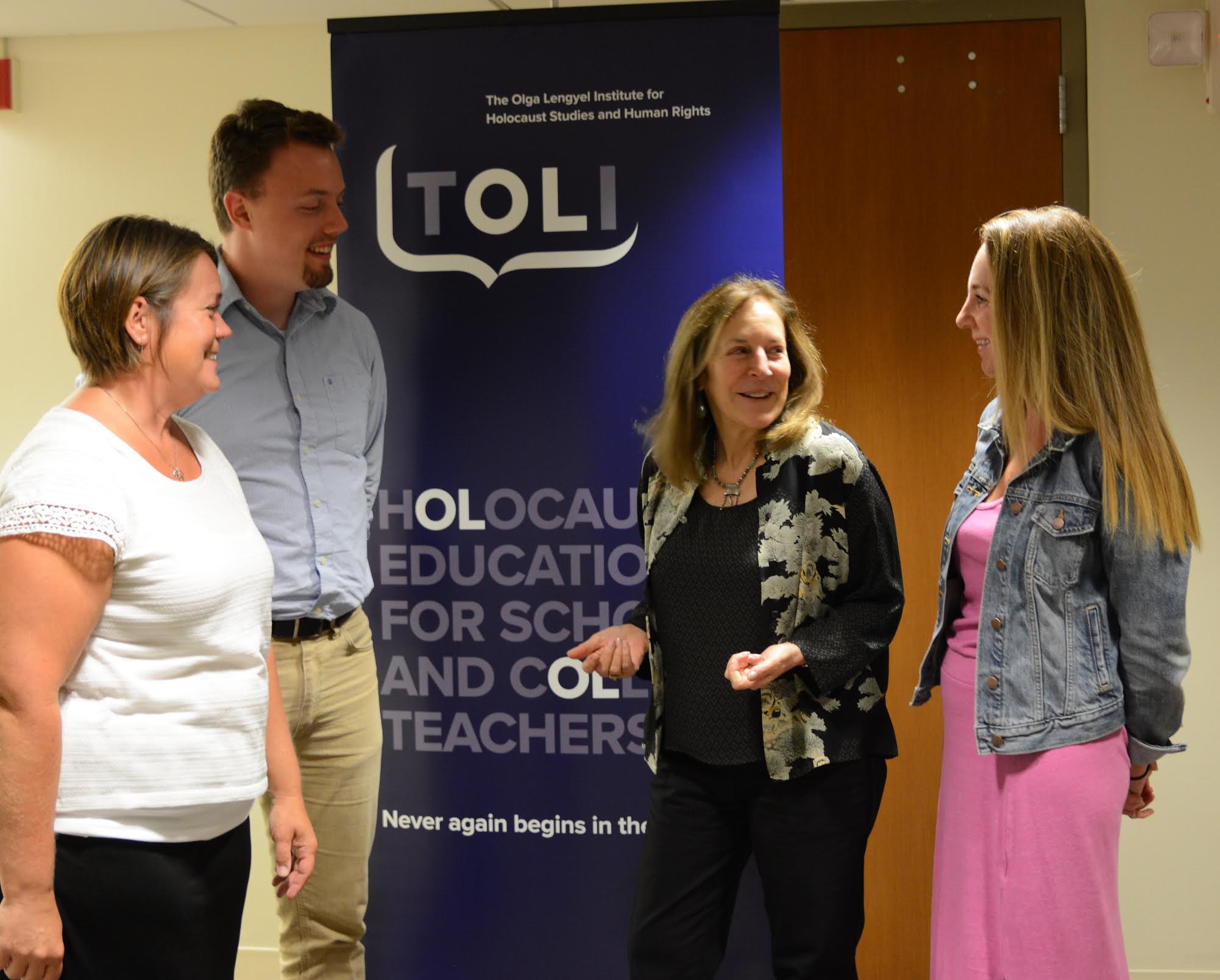Sondra Perl, Director of TOLI US Programs, second from right, at a TOLI seminar in Wisconsin.
Sondra Perl, Director of the Olga Lengyel Institute and academic architect of the TOLI seminars, traces her interest in Holocaust studies back to the summer of 1996, when she was teaching a graduate course for teachers in Austria. It was in Innsbruck, a city nestled in the Alps whose Jewish population vanished during the Holocaust.
Sondra was teaching writing and literature when she was confronted by her Jewish identity in a foreign context, one that would have been deadly in a previous era. She decided to confront her discomfort through writing and engage her students in the subject, an unconventional approach to teaching the Holocaust, mainly the domain of history or Jewish studies.
Sondra deftly navigated the turbulent responses of her students, many of whom were upset by Sondra’s raising the subject of their historical past. Over a period that spanned years, the teachers she taught opened up to this fraught topic, exploring the involvement of their families as well as what the Holocaust meant to them. That experience led to her seminal book, On Austrian Soil: Teaching Those I Was Taught to Hate, and later informed the approach of the first TOLI Summer Seminar and the seminars that followed annually.
The seminar’s origin was thus a confluence of interests and desires. David Field and Mark Berez, Chairman and President of TOLI, were interested in starting an educational program in honor of Olga Lengyel, a survivor of Auschwitz whose estate became the core funding for the new organization. “In the fall of 2005, David and Mark approached Frances Horowitz, the President of the Graduate Center of the City University of New York, where I was on the faculty, to recruit a scholar who could create a new Holocaust studies program,” Sondra explained. The three quickly found common purpose and inaugurated a pilot program the following summer, in 2006.
The pedagogical core of the seminar emerged from Sondra’s connection to the National Writing Project, an organization she had worked with since 1978 when she co-created the local NYC chapter. By bringing the National Writing Project’s emphasis on writing as a form of intellectual curiosity and personal expression to the study of the Holocaust, the Seminar has distinguished itself from other professional development programs on the Holocaust. “We understand deeply how writing and sharing form the bedrock that enables us to turn a classroom into a community,” Sondra explains.
David and Mark were particularly interested in reaching beyond the major urban areas, believing that the seminar “could provide a real service for teachers in rural areas who didn’t have as many resources and where there were few, if any, Holocaust survivors.” Sondra was already familiar with the National Writing Project’s Rural Sites Network and partnered with the NWP to reach out to those teachers. Today, the NY Seminar has broadened its reach to urban and suburban areas as well, enabling hundreds of teachers from throughout the US to attend the 12-day program, for many a life-changing experience.
From the early beginnings of the TOLI seminar, Sondra has had the help of two fellow veteran educators, Jennifer Lemberg and Alice Braziller. Both attended the first seminar in 2006 and now play pivotal leadership roles in TOLI’s success. She talks admiringly about her colleagues: “Jennifer brings a deep knowledge of theoretical approaches to our work and she is also attuned to the way studying genocide impacts individuals as they immerse themselves in atrocity and its aftermath. Alice plays a different role. She has become our social glue, guiding teachers to events in the city that lift their spirts and help them renew themselves after often grueling days of study.”
All three are crucial members of the teaching team, moving with care through a difficult yet immensely rewarding two weeks. “It’s the unexpected part of teaching that I love,“ Sondra reflected. “I’m keeping my eye on something amorphous but also real and large. Through writing, active listening, and sharing, the group engages in an open-ended inquiry. When it’s working, we get to a place of new learning, created by all of us. It’s always thrilling.”
The New York Seminar has also been the catalyst for advanced programs in which selected participants are guided in the creation of their own professional development programs, known as TOLI’s satellite seminars. From Montana to Mississippi, from California to Massachusetts, teachers from 19 states in the US have participated in satellite seminars, impacting countless students of all ages. In 2018 alone, there are twelve satellite seminars taking place across the country.
After so many years, Sondra still feels deeply satisfied and creatively fulfilled by the work she does. “In this time of unrest in our country when human rights are being trampled, I can’t think of anything more important.”
